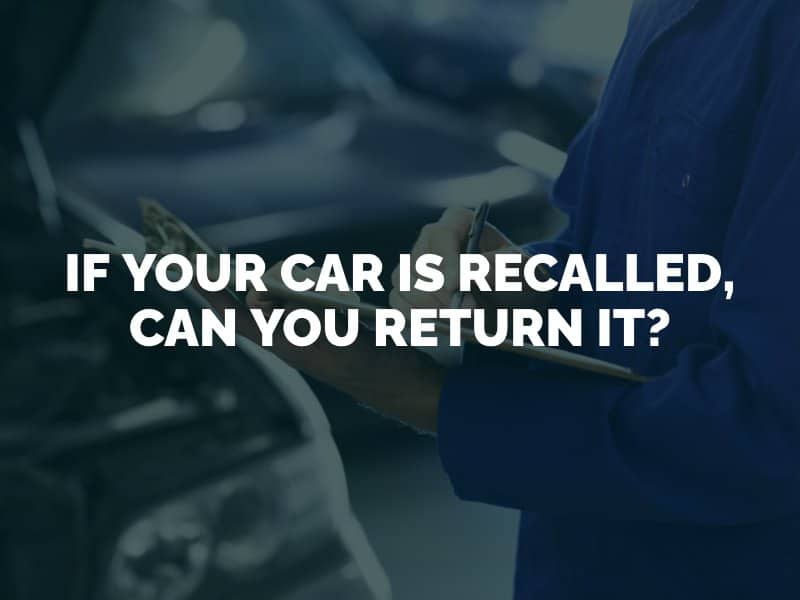Despite the responsibility that automakers have to keep the public safe by creating and distributing safe, well-tested vehicles, cars with dangerous defects are released every year. When these defects are discovered, the manufacturer legally must issue a vehicle recall. If you are notified about a recall involving your car, find out what to do to protect yourself from danger, as well as what your legal rights are if there is an accident.

A vehicle recall is a request to return, replace, repair or exchange a product after it is discovered that the product contains a defect that could potentially harm consumers. When a safety issue that endangers the public is noticed within an auto part, the manufacturing company may voluntarily issue a recall or a safety organization such as the National Highway Traffic Safety Administration (NHTSA) may order one. In most cases, a recall begins with multiple consumer complaints filed alleging a problem with the vehicle. The manufacturer or government agency will investigate and may recall the product if there is evidence of a defect.
In the event of a vehicle recall, manufacturers bear significant legal and ethical responsibilities to ensure consumer safety. Upon identifying a safety defect or noncompliance with federal safety standards, manufacturers are obligated to promptly notify the National Highway Traffic Safety Administration (NHTSA) and begin the recall process. This includes conducting a thorough investigation into the reported issue, determining the scope and severity of the defect, and developing an appropriate remedy plan.
Manufacturers must then notify affected consumers by mail, providing clear instructions on how to address the recall, including scheduling repairs or replacements at authorized dealerships. Moreover, manufacturers are required to provide these remedies at no cost to consumers, regardless of warranty status, and within a reasonable timeframe.
Failure to fulfill these obligations not only jeopardizes consumer safety but also exposes manufacturers to potential legal liabilities, including fines and civil penalties. Additionally, manufacturers are expected to cooperate fully with regulatory agencies throughout the recall process, providing timely updates and accurate information to ensure effective resolution and minimize risks to public safety. Ultimately, adherence to these obligations is paramount to maintaining consumer trust and upholding industry standards for product safety and accountability.
A vehicle part defect can refer to an issue with the overall design of the item, a mistake during its manufacture or assembly, or problems with how the item was marketed to consumers. Throughout history, vehicle recalls have often been associated with the following:
Any type of auto defect can put drivers, passengers and the public at risk of serious automobile accidents. Many different things can cause a vehicle recall, including a faulty part, a violated federal safety standard or an automaker’s failure to safety-test a vehicle before its debut.

If a vehicle gets recalled, the manufacturer must make a reasonable effort to notify known purchasers of the recall. You will most likely receive notice of a vehicle recall by mail. You can also check to see if a car you bought has been recalled by entering the Vehicle Identification Number (VIN) into the NHTSA’s recall search engine. Read the instructions and information on the recall notice carefully.
A recall will describe the nature of the issue and the part(s) affected. It will also give the manufacturer’s recommendation for what to do next. In most cases, the manufacturer will recommend that you cease the use of the vehicle immediately and contact the company for a free repair at the nearest dealership. In some cases, the recommended remedy is to return the vehicle for a free replacement. If you do not want to replace the car, the manufacturer will give you a refund for the full purchase price.
If the remedy is a free repair to fix or replace the defective car part, you generally do not have the right to return it or request a refund for your purchase. Instead, you should follow the recall’s instructions to have the issue fixed at no cost to you. Most repairs are done at local dealerships. The manufacturing company must give you an accurate estimate of how long the repair will take.
Your rights as a consumer during a recall include receiving a written notice and a cost-free remedy. If a defective auto part led to a car accident or injury, you may have grounds to file a product liability claim. A lawsuit seeks a financial recovery from the responsible party, such as the manufacturer or dealership. It is in your best interest to seek a vehicle repair or replacement as soon as possible after receiving a recall notice. Continuing to drive your vehicle while knowing that it has been recalled could impact your right to file a lawsuit for a related car accident in Denver.
In addition to federal regulations governing vehicle recalls, Colorado has its own set of laws and regulations that provide additional protections for consumers. Under Colorado law, 5 CCR 1001-24-E-IV, manufacturers are required to adhere to strict notification requirements when issuing recalls for vehicles sold or registered in the state. This includes notifying affected consumers by mail and providing clear instructions on how to address the recall and where to get into contact to learn more about the recall.
Colorado also imposes penalties on manufacturers who fail to comply with recall requirements, including fines and potential legal action. Furthermore, Colorado consumers have specific rights under state law, including the right to seek compensation for damages resulting from defective vehicles through product liability claims. It’s important for Colorado residents to familiarize themselves with these laws and understand their rights to ensure they are adequately protected during an auto recall. Consulting with a knowledgeable Denver personal injury attorney who is well-versed in Colorado recall laws can also provide valuable guidance and assistance in navigating the recall process and protecting one’s rights.